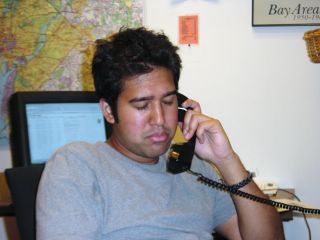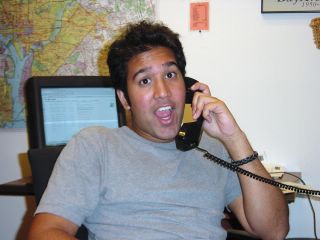Some days doing this job, you just feel like you have accomplished nothing the whole working day. Case jackets filed at the courthouse mysteriously go missing, and you leave empty-handed. Searches for an individual's contact information turn up nothing. Clients for whatever reason don't keep their appointments. Nobody
ever calls you back when you ask them to.
But compared to most situations in which you go home at the end of the day wondering where all your time and effort went, I don't think anything feels as fruitless and aggravating as trying to find a cop.
One important job of defense investigators is trying to interview possible witnesses for the prosecution. The goal is to take down a signed, official witness statement, thereby locking them into their story. Therefore when they take the stand, they can be impeached by the defense attorneys if there are any inconsistencies between their testimony and the statement they've given to the investigators. This is very valuable in case witnesses try to change their story, and it is also helpful in casting doubt upon a witness' reliability.
Unlike a lot of other people who might take the stand for the government, cops hold two valuable pieces of information that make them incredibly frustrating for defense investigators. First, they know exactly who you are and what you want from them the minute you pop onto their radar. Therefore, the minute cops hear that you are looking for them (which investigators try to keep under wraps as best they can), they - and all their fellow men and women in blue - will give you the run-around like there is no tomorrow. What else explains why Sachin and I have been unable to interview an Animal Control officer for about three weeks, despite the fact that a) we know when she works, b) we know where she lives, c) her supervisor has already given us the go-ahead to talk to her. Take another example in which while trying to find two cops to talk to who arrested our client, their co-workers have already given me and Sachin
three different times of day for when their shift starts. A typical attempt to reach them goes like this:
"We're here to see either Officer A or Officer B."
"A or B? They're already out on the streets/not working now."
"Can you please check? The last person we talked to told us they'd be just coming in to work right now."
"Oh nooo....They come in at [insert yet another time of day]
."
This happened today, again. Very defeating.
The other thing that cops know that makes them virtually useless to interview (much less take a statement from) is that simply they don't have to talk to you. Unlike your average person who feels like they want their side of the story told, or will talk simply because they are asked, cops know that talking to you - even if it doesn't hurt - will not help the government's case. And since dealing with defense investigators is inevitably a part of a cop's job description, they have plenty of practice shutting you down without a second thought. Sachin and I had an "interview" with a U.S. marshal a few weeks ago that lasted about a minute. Aside from their general unwillingness to talk, it also doesn't help that you're face-to-face with a man who could snap you in half.
But the great things about us investigators is that we're incredibly tenacious. Although Sachin did not seem too keen on this idea, I have vowed to set up a small tent outside Officers A and B's district station and embark on my first stakeout. But seriously, though - they're wrong if they think we're not going to keep going back there (and this goes for the Animal Control officer too). Sometime this summer, it will be a glorious moment when Sachin and I finally find them. And then, it will be the shortest interview ever as we wait for those soul-crushing words: "I'm not going to say anything about the case."















